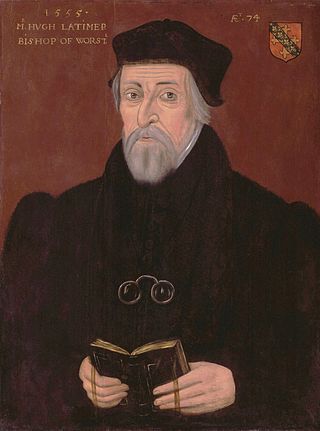
Hugh Latimer was a Fellow of Clare College, Cambridge, and Bishop of Worcester during the Reformation, and later Church of England chaplain to King Edward VI. In 1555 under the Catholic Queen Mary I he was burned at the stake, becoming one of the three Oxford Martyrs of Anglicanism.

John Foxe was an English clergyman, theologian, and historian, notable for his martyrology Actes and Monuments, telling of Christian martyrs throughout Western history, but particularly the sufferings of English Protestants and proto-Protestants from the 14th century and in the reign of Mary I. The book was widely owned and read by English Puritans and helped to mould British opinion on the Catholic Church for several centuries.

Rowland Taylor was an English Protestant martyr during the Marian Persecutions.

John Day was an English Protestant printer. He specialised in printing and distributing Protestant literature and pamphlets, and produced many small-format religious books, such as ABCs, sermons, and translations of psalms. He found fame, however, as the publisher of John Foxe's Actes and Monuments, also known as the Book of Martyrs, the largest and most technologically accomplished book printed in sixteenth-century England.

Anne Askew, married name Anne Kyme, was an English writer, poet, and Protestant preacher who was condemned as a heretic during the reign of Henry VIII of England. She and Margaret Cheyne are the only women on record known to have been both tortured in the Tower of London and burnt at the stake.
Nicholas Shaxton was Bishop of Salisbury. For a time, he had been a Reformer, but recanted this position, returning to the Roman faith. Under Henry VIII, he attempted to persuade other Protestant leaders to also recant. Under Mary I, he took part in several heresy trials of those who became Protestant martyrs.

John Bradford (1510–1555) was an English Reformer, prebendary of St. Paul's, and martyr. He was imprisoned in the Tower of London for alleged crimes against Queen Mary I. He was burned at the stake on 1 July 1555.

Thomas Harding was a sixteenth-century English religious dissident who, while waiting to be burnt at the stake as a Lollard in 1532, was struck on the head by a spectator with one of the pieces of firewood, which killed him instantly.

Walter Milne, also recorded as Mill or Myln, was the last Protestant martyr to be burned in Scotland before the Scottish Reformation changed the country from Catholic to Presbyterian.

George Marsh was an English Protestant martyr who died in Boughton, Chester, on 24 April 1555 as a result of the Marian Persecutions carried out against Protestant Reformers and other dissenters during the reign of Mary I of England. His death is recorded in Foxe's Book of Martyrs.

Agnes Prest was a Cornish Protestant martyr from the reign of the Catholic Queen Mary. She was burned at the stake at Southernhay in Exeter in 1557.

The Colchester Martyrs were 16th-century English Protestant martyrs. They were executed for heresy in Colchester, Essex, during the reigns of Henry VIII and Mary I. Their story is recorded in Foxe's Book of Martyrs.
The Canterbury Martyrs were 16th-century English Protestant martyrs. They were executed for heresy in Canterbury, Kent and were the last Protestants burnt during the reign of Mary I. Their story is recorded in Foxe's Book of Martyrs.
Anthony Pearson was a 16th-century English Protestant who was executed for heresy during the reign of King Henry VIII of England. He is known as one of the Windsor Martyrs.
Thomas Tomkins was a 16th-century English Protestant martyr. He was a weaver from Shoreditch, London, and was examined by Bishop Bonner. Despite having been subjected to torture, he insisted that he did not believe in transubstantiation. As a result, he was burned to death at Smithfield on 16 March 1555. His story is recorded in Foxe's Book of Martyrs.
William Pygot was a sixteenth-century English butcher and Protestant martyr. His story was recorded in Foxe's Book of Martyrs. For denying transubstantiation, he was burned to death at Braintree, Essex, on 28 March 1555.
The Lewes Martyrs were a group of 17 Protestants who were burned at the stake in Lewes, East Sussex, England, between 1555 and 1557. These executions were part of the Marian persecutions of Protestants during the reign of Mary I.

The Actes and Monuments, popularly known as Foxe's Book of Martyrs, is a work of Protestant history and martyrology by Protestant English historian John Foxe, first published in 1563 by John Day.

The Stratford Martyrs were eleven men and two women who were burned at the stake together for their Protestant beliefs, either at Stratford-le-Bow, Middlesex or Stratford, Essex, both near London, on 27 June 1556 during the Marian persecutions.













